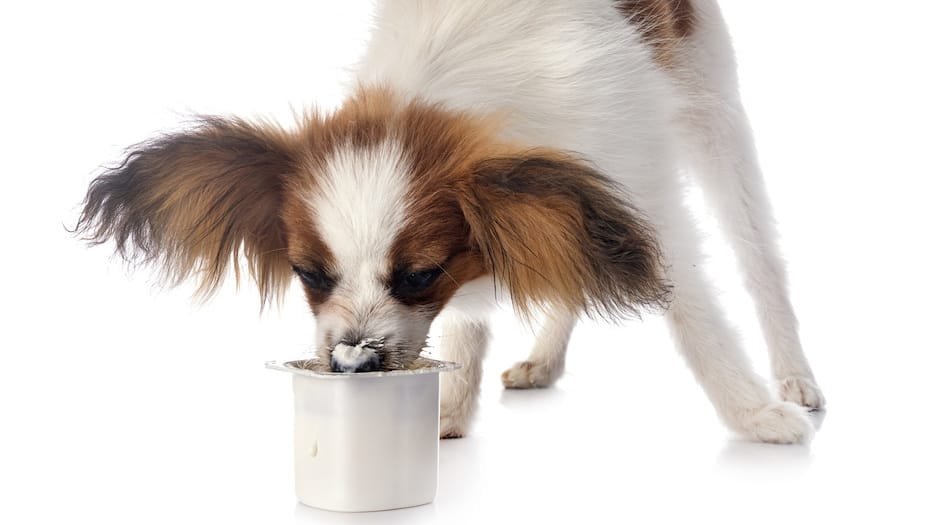Ever caught your pup eyeing your bowl of yogurt with that irresistible, hopeful look and wondered, can dogs eat yogurt? Well, you’re in the right place to find out! The simple answer is yes, dogs can eat yogurt but there are some things to consider. So let’s explore the hows, whats and whys, to make it a beneficial part of your pups nutrition in this article.

Before introducing any new foods to your dog’s diet, always consult your vet. Individual dogs may have different intolerances, dietary needs, and health considerations. This article is not a substitute for professional veterinary advice.
Is Yogurt Safe for Dogs?
Yogurt is generally safe for dogs if it’s plain and free from added sugar or artificial sweeteners. Some dogs are lactose intolerant, so if you’re unsure it’s best to introduce yogurt slowly and watch for any signs of digestive upset.
Health Benefits of Yogurt for Dogs
Including yogurt in your dog’s diet can help ensure they get these vital nutrients.
Minerals & Vitamins
Yogurt is a rich source of vitamins and minerals including
- Vitamin D
- Vitamin B
- Calcium
- Magnesium
- Phosphorous
- Potassium
- Zinc
Protein
Yoghurt is a rich source of protein which supports muscle development and repair.
Probiotics & Digestive Health
Yogurt is rich in probiotics, which are beneficial bacteria that support your dog’s digestive health. These probiotics can help balance the gut flora, improve digestion, and boost the immune system. They can help with issues like diarrhea, constipation, and even allergies. Adding a small amount of yogurt to your dog’s diet can provide these beneficial bacteria and improve their overall health.
The probiotics in yogurt not only support gut health but also aid in the absorption of nutrients. A healthy gut can more effectively absorb vitamins and minerals from food, ensuring your dog gets the most out of their diet. This can lead to better overall health and vitality.
What Kind of Yogurt is Best for Dogs?
The best yogurt for your dog is plain, unsweetened yogurt. Greek yogurt is also a great option due to its thicker texture and higher protein content. Avoid any flavored yogurts or those with added sweeteners like xylitol, which is toxic to dogs.
Plain Yogurt
Plain yogurt is the safest option for your dog. It’s free from added sugars and artificial sweeteners, making it a healthy choice. Plain yogurt can be mixed with your dog’s regular food or served as an occasional treat.
Greek Yogurt
Greek yogurt is a thicker, creamier version of regular yogurt, and it’s packed with protein. This makes it a great option for dogs, especially those that are active and need more protein in their diet. Just like plain yogurt, it should be unsweetened and free from additives.
Flavored Yogurt and Additives
While it might be tempting to share your favorite flavored yogurt with your dog, it’s best to avoid these. Flavored yogurts often contain added sugars, artificial sweeteners, flavourings and colorings that can be harmful to your dog. Stick to plain yogurt to keep things safe and healthy.

Common Concerns with Dogs Eating Yogurt
Lactose Intolerance
Just like some humans, some dogs are lactose intolerant. This means their bodies can’t properly digest lactose, leading to stomach upset, gas, or diarrhea.
If your dog is lactose intolerant, it’s best to avoid yogurt altogether or opt for lactose-free varieties.
Added Sugars & Artificial Sweeteners
Many commercial yogurts could contain added sugars or artificial sweeteners, colors and flavors. Xylitol is a commonly used artificial sweetener, which is toxic to dogs. Always read the label and choose plain, unsweetened yogurt to avoid harmful additives.
Pasteurization
While pasteurization kills harmful bacteria, it can also eliminate some of the beneficial good bacteria. Opt for yogurts that state they contain live and active cultures to ensure your dog gets the probiotic benefits.
How Much Yogurt Can Dogs Eat?
Recommended Serving Sizes
When it comes to serving sizes, a little goes a long way. For small dog breeds, a teaspoon of yogurt is sufficient, while larger dogs can enjoy a tablespoon. Too much can lead to digestive issues, so it’s important to moderate the amount.
Frequency of Yogurt Treats
Yogurt should be given as an occasional treat rather than a daily staple. Once or twice a week is plenty to provide the health benefits without overwhelming your dog’s digestive system.
Tasty Yogurt Treats for Dogs
Looking for a fun way to give your dog yogurt? Try making frozen yogurt treats! Mix plain yogurt with a bit of pureed fruit (like blackberries or strawberries), spoon into ice cube trays, and freeze. Your dog will love these refreshing treats, especially on hot summer days.

FAQs
Can dogs safely eat Greek yogurt?
Yes, Greek yogurt is safe and nutritious for dogs.
Is yogurt good for dogs’ upset stomach?
If your dog has diarrhea, a small amount of plain yogurt can help firm up their stools. The probiotics in yogurt can balance gut bacteria and improve digestive health. However, always consult your vet before introducing yogurt as a remedy.
Is yogurt or milk better for dogs?
Yogurt is better than milk due to its probiotics and lower lactose content.
What to avoid in yogurt for dogs?
Avoid added sugars, and artificial sweeteners, flavorings and colorings. Plain. live yogurt is best.
Does yogurt help dogs with itchy skin?
Some dogs with itchy skin may benefit from the probiotics in yogurt, which can support a healthy immune system. However, yogurt alone might not be enough to address skin issues, so it’s important to consult your vet for a comprehensive treatment plan.
Why do dogs love yogurt so much?
Dogs enjoy the creamy texture and taste of yogurt just as much as we do. And it’s a healthy treat for them to have on occasion as part of a balanced diet.
Why does my dog throw up when he eats yogurt?
Your dog may be lactose intolerant or have a sensitive stomach. Consult your vet.
Can dogs have a lick of yogurt?
Yes, a small lick is safe, but avoid flavored yogurts with additives.
Can I mix yogurt with my dog’s food?
Yes, mixing yogurt with food can add a creamy texture and a boost of probiotics, making mealtime more nutritious.
Can dogs eat yogurt with fruit?
Yes. Adding a bit of fresh fruit like blackberries or apples can add extra health benefits to the treat.
What brand of yogurt is safe for dogs?
Choose brands that offer plain, unsweetened yogurt with live cultures. Read the ingredients to make sure there are no artificial sweeteners or other chemicals.
Which is better for dogs, yogurt or cottage cheese?
Both are good in moderation, but yogurt also has probiotics that can benefit digestive health.
Can I give my dog yogurt every day?
It’s best to give yogurt as an occasional treat rather than daily.
Is yogurt or Greek yogurt better for dogs?
Both are good but Greek yogurt has more protein. make sure to choose plain, unsweetened yogurts with live probiotic cultures for maximum benefit.
Is yogurt good for dogs’ teeth?
Yogurt can help maintain dental health due to its calcium content. However, it’s not a substitute for regular dental care like brushing your dog’s teeth or providing dental chews.
Final Thoughts on Can Dogs Eat Yogurt
Yogurt is great for dogs. Providing your pet is not lactose intolerant and has no other health issues or intolerances, it can be a healthy addition to your dog’s diet, offering probiotics, calcium, and protein as well as other minerals and vitamins. It supports digestive health, nutrient absorption, and overall well-being when given in moderation. Choose plain, unsweetened yogurt or Greek yogurt without additives. Introduce yogurt slowly, monitor your dog’s reaction, and keep servings small. If at all unsure consult your vet first. Yes, yogurt in moderation is good for dogs and can be a treat to supplement a balanced diet, to enhance your dog’s health and happiness.





